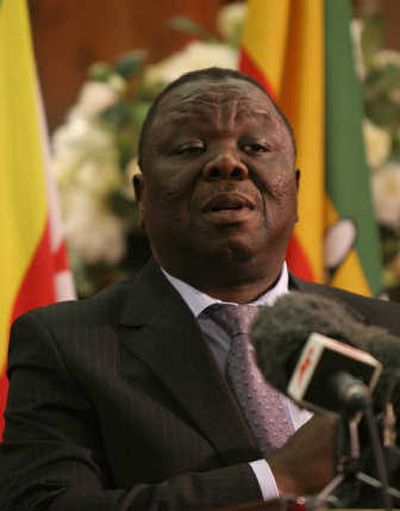Opposition leader agrees to runoff in Zimbabwe

PRETORIA, South Africa – Zimbabwean opposition leader Morgan Tsvangirai announced Saturday that he had decided to take part in a runoff election against President Robert Mugabe, saying that he believes the vote “could finally knock out a dictator for good.”
Tsvangirai previously had ruled out participating in a runoff, saying he had won outright in the disputed March 29 elections. But in announcing his decision to return to Zimbabwe in coming days, he said that despite the risks faced by opposition activists, it would be a betrayal of Zimbabweans not to contest the second round.
“The people are victorious, and they are being punished for their victory,” he said at a Pretoria news conference Saturday. “We must free ourselves from those who would steal victory from fellow brothers and sisters by using guns, sticks and screwdrivers.”
Promising a “victory tour” of his country, he said, “We know a runoff election could finally knock out a dictator for good.”
Tsvangirai’s Movement for Democratic Change won the most parliamentary seats and controls Parliament with the help of a breakaway MDC faction. According to official results, Tsvangirai also won the most presidential votes, but fell just short of the 50 percent plus one vote required to win outright, necessitating a runoff.
The runoff election date has not been announced, but under law it should be held within 21 days of the first election results, which were announced just more than a week ago. Tsvangirai said by law the vote should be held May 24.
Tsvangirai called on Zimbabwe’s security forces, ruling party youths and war veterans to stop attacking civilians.
“For those carrying out the violence on the ground – the police, the militia, the army and the so-called war veterans – now is the time to give very serious thought to the implications of further attacks on innocent civilians. You are breaking Zimbabwean and international law, and the whole world is watching.”
Zimbabwe Doctors for Human Rights, a human rights organization in Zimbabwe that has been monitoring the casualties in post-election violence, said Friday that more than 900 people have been treated for injuries such as fractures and deep tissue damage as a result of beatings, but added that actual numbers were much higher because many had no access to medical care.